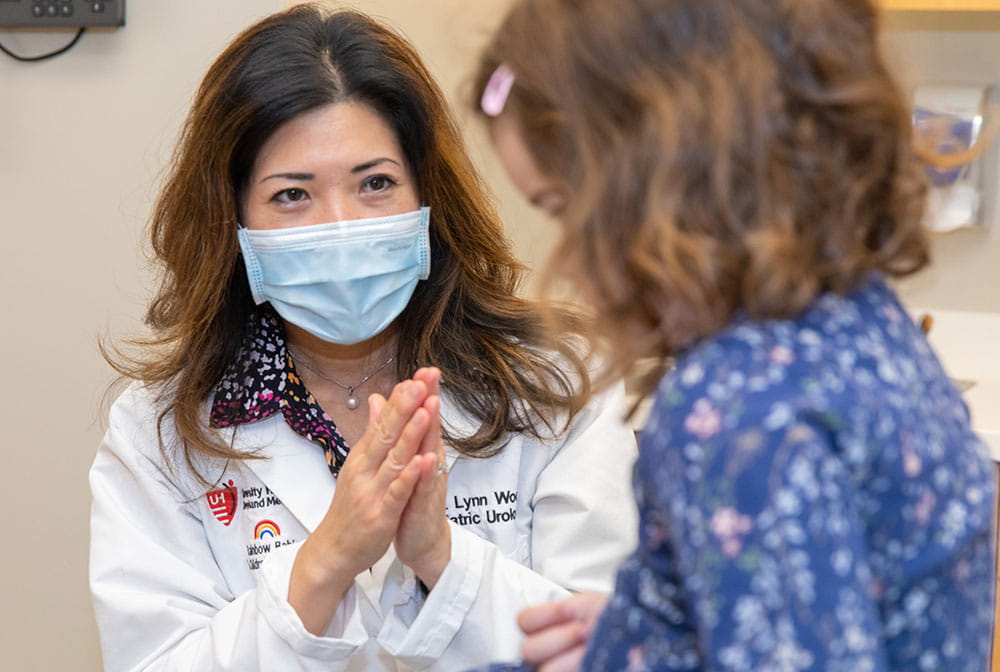University Hospital's Women Urologists are Leaders in Their Field
July 07, 2021
In a specialty long dominated by men, female physicians are taking on key roles
Innovations in Urology | Special Issue | September 2021
Urology has the smallest percent of women physicians of any medical specialty, according to the Society for Women in Urology. But that statistic is changing.
“The University Hospitals Urology Institute is a catalyst for this change and is committed to bringing diverse perspectives to improve gender disparity,” says Irina Jaeger, MD, Chief of Urology at UH Regional Hospitals. “Traditionally, the field of urology has been dominated by male physicians, mostly because people typically associate urologic problems with men who may have prostate cancer or erectile dysfunction.”
UH Receives National Recognition
Irinia Jaeger, MD, is the first woman in the country to receive the designation of Center of Excellence for GreenLight™ Laser Therapy treatment – a minimally invasive outpatient procedure for men looking to treat their benign prostatic hyperplasia (BPH). The designation is based on outcomes. Dr. Jaeger also is the second woman in the country to receive a Center of Excellence designation for the UroLift procedure. “BPH is a lifestyle problem that affects the patient, the family and couple dynamics,” Dr. Jaeger says. “Unfortunately, many men wait too long to come in for treatment. There has been an explosion of new, minimally invasive treatments. UroLift is the least invasive treatment for BPH. Recovery is quick and the results are instant.”
 Irina Jaeger, MD
Irina Jaeger, MDToday, 50 percent of urology residents at UH are women, compared to an industry average of 27 percent, and many women in the UH Urology Institute are in leadership roles.
“Women are definitely becoming more interested in the field,” says Lynn Woo, MD, Director, Urology Residency Program at University Hospitals Cleveland Medical Center. “Urology is not just about men’s health. It extends to women and children.”
 Lynn Woo, MD
Lynn Woo, MDDr. Woo, who specializes in pediatric urology, says she was drawn to the field because her mentors found it to be a rewarding specialty. She appreciated the fact that urologists were able to develop close relationships with patients and seemed fulfilled by their work.
“Urologists do not shy away from uncomfortable or personal information, and they can put people at ease discussing intimate details or personal facts,” Dr. Woo adds. “We’re all focused on improving patients’ quality of life.”
Debby Chuang, MD, Chief of Urology at UH Ahuja Medical Center, was also inspired to pursue a urology specialty by her mentors in medical school. She was also drawn to the diversity of procedures in urology.
 Debby Chuang, MD
Debby Chuang, MD“The Urological Institute appointed me Chief of Urology at Ahuja Medical Center,” Dr. Chuang says. “This innovative move gave me an opportunity to learn how to build a practice, build teams and expand service lines.”
Laura Bukavina, MD, MPH, a 6th-year UH Urology Institute resident who will stay on as a provider following her fellowship in urologic oncology, pursued this specialty to see female patients’ perspective in a male-dominated field. Dr. Bukavina’s specialty is bladder cancer, which, of course, affects both men and women.
“Women will naturally champion the cause of women’s health in a different, and maybe more effective way,” Dr. Bukavina says. “They understand and relate to certain intricacies of urologic care, such as female sexual functioning and quality of life, that may otherwise be missed, especially when dealing with a cancer diagnosis.”
Women urologists, who now make up more than 10 percent of the urology workforce (it’s more than 20 percent for women 45 and younger), also tend to spend more time in a typical office visit than a male physician.
Fostering women urology leaders
For years, women were not an integral part of the UH Urology Institute leadership team. That, too, is changing and now the gender split is close to 50/50.
Dr. Lee Ponksy, MD, Chairman of the UH Urology Institute, is a champion of ensuring women have access to leadership, training, mentorships and support, Dr. Woo says. “The overall culture of the institute is a family-like environment. It supports female faculty, recognizing that women are often pulled in many directions by both career and childcare obligations.”
“Mentorship is fundamental for women surgeons in training,” notes Dr. Bukavina. “Trainees at UH are all encouraged and supported to participate in Society of Women in Urology programs and other professional societies. Our residency program has historically been very diverse and now nearly 50 percent of our recruits are female."
Dr. Jaeger, who specializes in BPH treatment, has created an endourology hub for east Cleveland. It has allowed her to grow professionally as a leader and build something from the ground up to ensure better patient access and care.
 Britt Conroy, MD, PhD, JD
Britt Conroy, MD, PhD, JDDr. Jaeger says “We are also able to accommodate patients locally, which reduces patient stress and makes treatment really convenient to where patients live and work.”
 Rachel Pope, MD
Rachel Pope, MDOther female leaders in the Urology Institute are leading their areas of expertise as well. Britt Conroy, MD, PhD, JD, Director of Clinical Research at the UH Urology Institute, is helping to build an infrastructure to support urologic clinical research as well as using artificial intelligence (AI) and data analytics to improve patient care.
Rachel Pope, MD, MPH rounds out the female leadership team as Division Chief of Female Sexual Health, a multi-disciplinary collaboration of women’s health experts who address sensitive issues, such as sexual dysfunction.
The future of women in urology
“There’s so much more awareness about how competent and compassionate women are as providers,” Dr. Woo says. “Urology was always deemed a field in which you took care of ‘old guy’ issues, but now we’re seeing it’s so much more than that. We’re providing improved care for all members of society, and are more cognizant that it’s not just men who have urologic needs. Furthermore, some women patients may feel more comfortable with a woman provider.”


